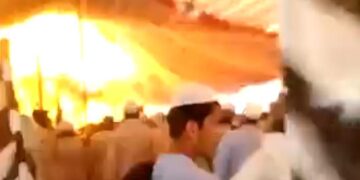Local reports said the incident occurred in the province of Balochistan as the community came together to observe this significant religious occasion.
At least 50 people were killed and over 50 injured after a bomb exploded near a mosque in southwestern Pakistan, where Muslims gathered to celebrate the birth of Prophet Muhammad on Friday.
Local reports said the incident occurred in the province of Balochistan as the community came together to observe this significant religious occasion.
In response to the dire situation, authorities in Balochistan declared a state of emergency to address the immediate aftermath of this horrifying incident. Currently, no specific group has claimed responsibility for the attack, adding to the perplexing nature of the tragedy.
A separate explosion rocked a mosque near Peshawar City in the Khyber Pakhtunkhwa province in a parallel and equally distressing development. Details regarding casualties in this incident remain forthcoming.
Footage captured at the scene in Mastung, a city in Balochistan, portrayed scenes of injured individuals receiving assistance from emergency responders and concerned locals.
The chief of Balochistan’s police, Abdul Khaliq Sheikh, confirmed that the explosion was a suicide blast. Tragically, a senior police officer lost his life while attempting to thwart the attacker.
Pakistan’s Interior Minister Sarfraz Bugti swiftly denounced the blast as a “very heinous act” and condemned what he characterised as “terrorist attacks” occurring in Balochistan and Khyber Pakhtunkhwa.
Regarding the incident in Khyber Pakhtunkhwa, a spokesperson for the local police department, disclosed that two suicide bombers had been intercepted with a vehicle carrying a significant quantity of explosives. The spokesperson recounted how one of the bombers was neutralised as he attempted to enter the mosque in the town of Hangu.
The full extent of the casualties at the Hangu mosque remains uncertain, with reports suggesting that several individuals may be trapped beneath the debris caused by a collapsing roof. The mosque is part of a police complex that can accommodate 40 to 50 people, as confirmed by local law enforcement authorities who shared this information with the BBC.
Balochistan, Pakistan’s largest province bordering Afghanistan and Iran, has frequently witnessed armed conflicts involving groups such as the Tehrik-e Taliban Pakistan (TTP), the Pakistani Taliban, and the Islamic State. Only earlier this month, a similar explosion in the same district injured at least eleven people, including a prominent Muslim leader.
However, it is worth noting that the TTP has publicly disassociated itself from any involvement in the Friday blast, asserting that such attacks contradict its policies. The group vehemently condemned the attack in Khyber Pakhtunkhwa, emphasising that “mosques, schools, and public gatherings” do not align with its intended targets.




































